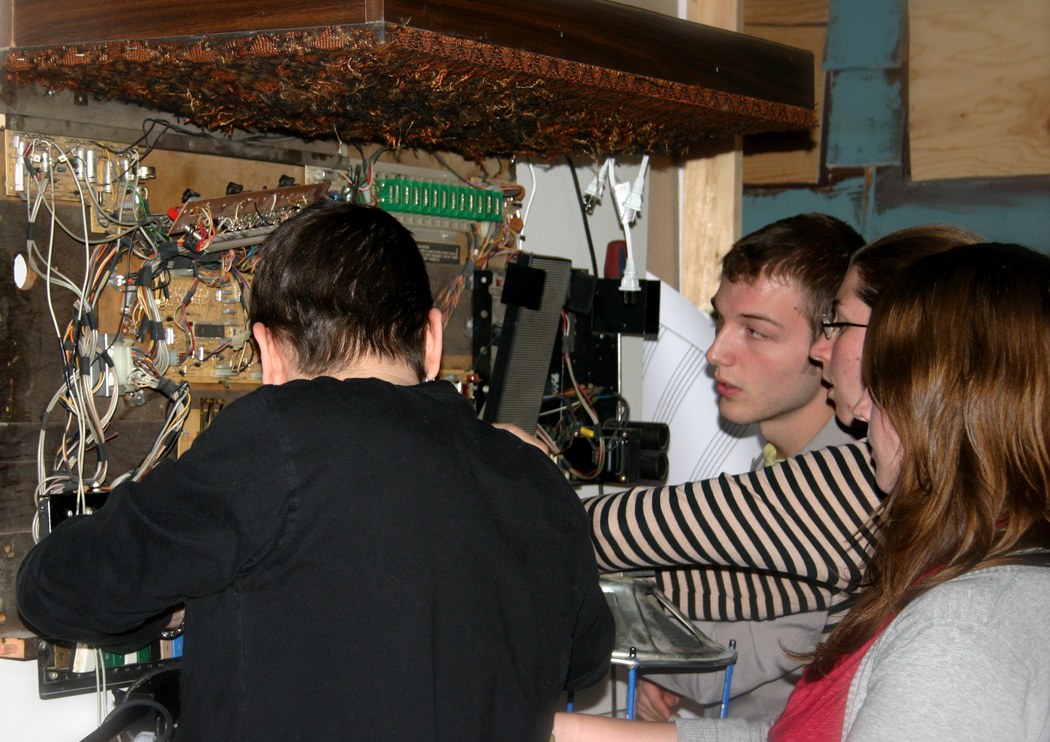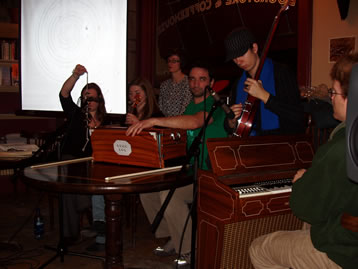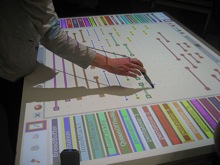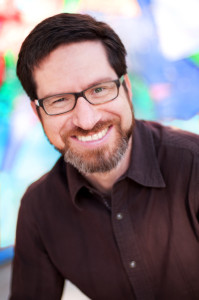
XIE collaboration with the School of Art.
XIE: ‘Working at the level of pure musicality’
Gordon Fitzell believes that in searching for beauty, one can catch glimpses of truth in the universe. And he sees such arcane and profound possibilities in improvisational experimental music.
For several years now, the University of Manitoba music professor and composer has lead the eXperimental Improv Ensemble, XIE (pronounced “shay”), an interdisciplinary musical performance ensemble offered by the Desautels Faculty of Music. Students from a variety of disciplines participate in the ensemble, including classical and jazz students – and even opera students – from the Faculty of Music, but also students from computer science, film studies and the School of Art.
The XIE has been preparing for their monthly open-stage event which opens up the ensemble to participation by other musicians and artists from the community.
“Jamming the Dragon” is held in a private open-loft studio in Winnipeg’s Exchange District. Thursday, April 8, will be this season’s last installment.
Other recent projects include collaborations with U of M Faculties of Architecture, Computer Science, Electrical Engineering and Sculpture, as well as with external partners such as GroundSwell, Cinémathèque, the WAG, the WSO, the Museum of Clear Ideas and Amnesty International.
Typically, XIE performs in an electronic environment. On occasion, says Fitzell, “we give acoustic performances, such as for performance-installations in which the architectural elements of a space serve as the musical instruments.”
Teaching musical improvisation as a course, Fitzell was forced to experiment and to address the philosophical underpinnings of the course
Fitzell officially launched the XIE in 2006, after running the ensemble as a loose, extracurricular activity for several years. He had plenty of experience in improvisation as a musician but little as an instructor or director. Since then, the improvisatory ensemble work has become an integral part of his pedagogy.
Teaching musical improvisation as a course, Fitzell was forced to experiment and to address the philosophical underpinnings of the course. At first he had many questions but few answers. There were countless things to ponder, notes Fitzell.
“How does one impart to others the seemingly mysterious and illusive skills of free improvisation — the ability to react to the moment in a way that is meaningful yet different every time? How much direction versus freedom should one provide in a rehearsal of free improvisation? Should one focus more on technical skills or philosophical approaches?
“Initially at a loss, I leaned on my colleagues for help. Slowly we began to make some progress. Eventually a path — one richer than I had imagined — began to reveal itself,” he said.
Fitzell: Eventually a path — one richer than I had imagined — began to reveal itself.”
The ensemble is eclectic and performance-oriented, with wideranging activities from live soundtrack performance to sound installation design. Directing it has cast Fitzell’s teaching and practice into new levels of awareness.
Awareness, in fact, is one of the primary pedagogical principles discovered by Fitzell through the XIE.
Other principles espoused by Fitzell through his experience are subjectivity, detachment, meditation, role-playing, listening, self-reflection, practice, collective learning, collaboration, and interdisciplinarity. Fitzell feels that the kind of improvisatory work done in the course helps participants develop their musicality and tune into a larger group awareness, a sort of collective consciousness and connection to a universal flow of energy.
“Because we don’t draw from traditional experiential structures, we tend to engage a different part of the musical mind.”

The XIE performs a live soundtrack to Marcel Duchamp’s Dadaist film Anémic cinéma at Mondragon Bookstore and Coffeehouse in Winnipeg. Photo © 2007 Gordon Fitzell.
“Because we don’t draw from traditional experiential structures, we tend to engage a different part of the musical mind,” said Fitzell.
In its lack of standardized structure, he characterizes the XIE as having a healthy subversive element, and this is part of what drives his own interest, along with the XIE’s experimental tone, which Fitzell says “keeps the approach fresh.”
“As an instructor, it has been incredibly refreshing to work at the level of ‘pure musicality’ — not on preliminary technicalities but directly on intuition and creative expression.”
And though students come to XIE from various different disciplines, with differences in the way they express themselves, says Fitzell, through a collaborative process, they often arrive at a similar place. “We can use a common language to address things like directionality, form, colour, structure, and emotive responses,” he said.
The word ‘xie’ is a transliteration of the Chinese character for the expression of gratitude. “This connotation of the group’s name is not entirely coincidental, and it serves as a reminder to maintain an attitude of appreciative awareness,” said Fitzell.
“The ensemble is very close to my heart, and I sometimes forget that its members are my students.”
This article originally appeared in the April 8, 2010 edition of The Bulletin.








